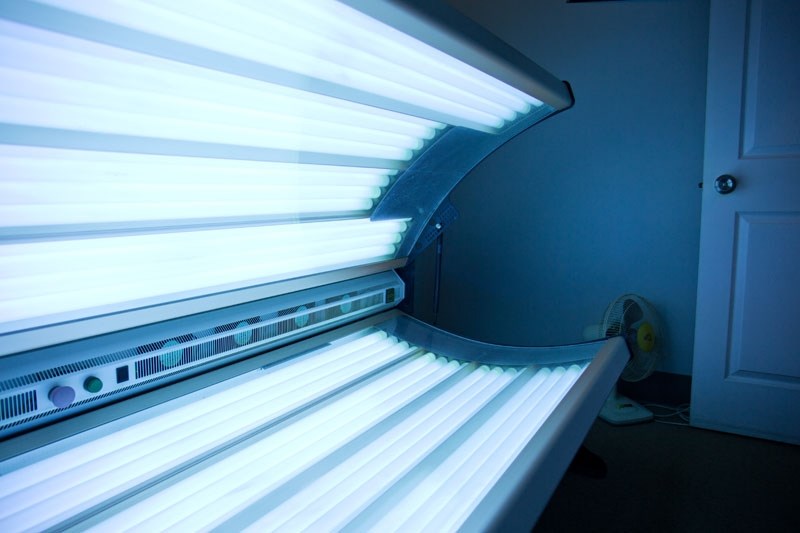The Canadian Cancer Society is demanding the provincial government enforce an act that would prohibit the use of tanning salons for anyone under the age of 18.
The Skin Cancer Prevention (Artificial Tanning) Act was passed in 2015, but has yet to be enforced.
Research shows that exposure to tanning beds at a younger age is linked to an increased risk of skin cancer. Skin cancer is one of the most commonly diagnosed cancers among young people between the ages of 15 and 29.
Evie Eshpeter, spokesperson for the Canadian Cancer Society, sent a letter to Health Minister Sarah Hoffman outlining the society’s concerns on March 6.
“The longer we wait, the longer we’re denying protection for our youth,” she said.
Eshpeter has yet to hear back from the minister, but says since sending the letter Hoffman has been meeting with stakeholders to discuss the act.
The Canadian Cancer Society resubmitted recommendations on how to implement the act to the provincial government yesterday. The recommendations included suggestions on signage in salons and identification of patrons.
Alberta is the last province that allows minors to use tanning beds with parental consent.
If enforced, tanning salons would also have to display health warnings within their businesses.
Jessica Robertson, owner of Viva Tan in St. Albert, says she would be in favour of the changes.
“As for kids, they shouldn’t be tanning because they will overdo it,” she says. “They’ll get a little bit here, then go to another tanning salon and then another. That’s what we used to do when we were teenagers.”
Robertson took over Viva Tan in November and says she’s only encountered one minor wanting to use a tanning bed.
The minor has psoriasis, a condition where skin cells multiply up to 10 times faster than normal. The skin disorder causes red plaques covered in white scales.
UVA and UVB light have helped manage the disorder, prompting some with the skin condition to seek out tanning beds.
Robertson told the minor’s parent that she could use the tanning bed if the youth had a doctor’s note in addition to parental consent. She says the parent didn’t return back to the salon.
Eshpeter says UVA and UVB light is used to treat psoriasis, but is safer in a medical setting. Having the skin condition herself, she says it’s better to have it treated in a controlled setting.
“It’s prescribed by a physician and you’re overseen by a physician and dermatologist. It’s very brief, it’s very controlled and the equipment is completely different,” she says.
Robertson says people will go to a tanning salon for a variety of reasons, such as getting a base tan before travelling and special events.
She says most tanning salons won’t allow minors to use their facilities without parental, and sometimes a doctor’s, consent.
Whenever a new customer comes into the salon they’re given a questionnaire and form to fill out at Viva Tan. A list of health risks associated to tanning beds are listed on the form, and on the tanning beds.
George Radford, co-owner of Island Tanning in St. Albert, says he thinks the act is good, but feels parts of the document are a little excessive.
Patrons who appear under the age of 25 would need to provide identification to the salon, under the act.
“It’s ridiculous,” he says. “It could be a good thing, but I think it’s a little too much. After working here for 14 years I can look at someone and tell how old they are.”
At Island Tanning minors can use the facility with parental consent. The tanning salon opened 14 years ago and Radford says only a few dozen minors have come in through the doors.
“We have always had the same policy because for longer than 14 years it’s been the general consensus that the tanning age should be 18,” he says.
If the act is enforced, Radford says he won’t have a problem following the rules. He adds that there should be some accountability that falls on the consumer instead of solely the business owner.
Eshpeter says shortly after the Alberta act was passed in 2015, Saskatchewan had drafted and approved its own act.
Within two months Saskatchewan enforced the act, banning minors from using tanning salons.
“(The Alberta government) said they were working on the regulations, they want to make sure they do it right and sometimes these things take time,” she says. “But you know we have examples across the country to follow and we’re now the last province to implement regulations.”
She says Premier Rachel Notley responded to the society stating that the government has been dealing with other priorities.
“Our concern is that it’s been two years, that means those who are underage have been able to tan during that time,” Eshpeter says,
In the meantime potentially new generations of young people have been introduced to tanning and are putting themselves at increased risk, Eshpeter said.




